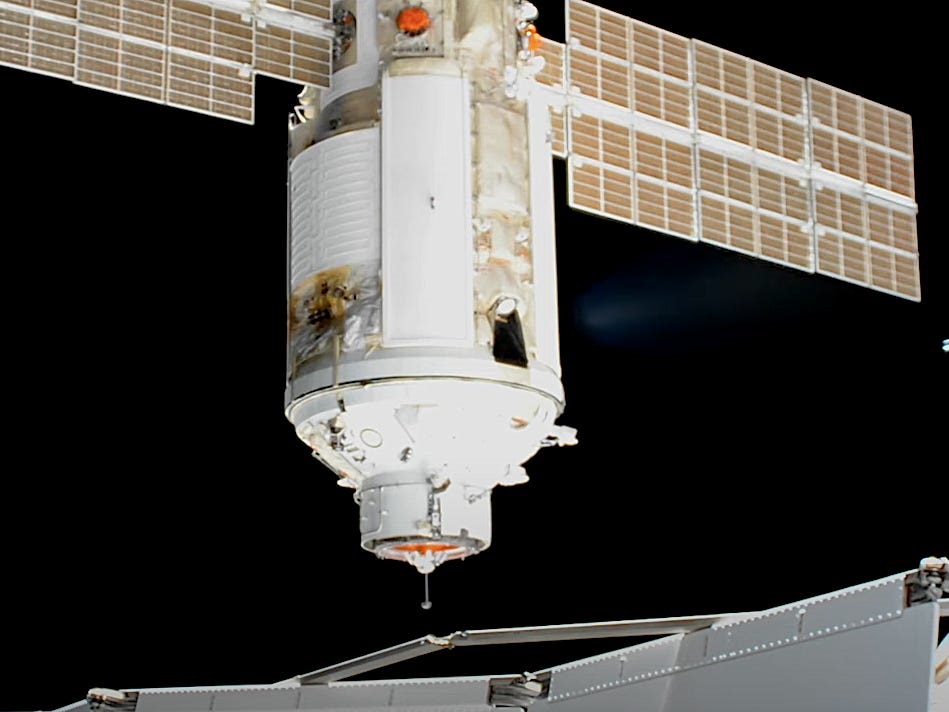Businessinsidercoza Russias new space station module glitched pushing the entire ISS out of position
 A screenshot from NASA's livestream shows the Nauka module approaching its port on the International Space Station, July 29, 2021.
A screenshot from NASA's livestream shows the Nauka module approaching its port on the International Space Station, July 29, 2021. NASA via Youtube
A new Russian space-station module malfunctioned after it docked to the station on Thursday. The module, called Nauka, starting unexpectedly firing its thrusters â€" which moved the entire station out of position.
The long-awaited science module had already encountered several technical issues on its way to the ISS, but once it docked to the space station on Thursday morning, it seemed to be in the clear.
But about three hours after its arrival Nauka began firing its thrusters, which rotated the station by 45 degrees. Space journalist Anatoly Zak was among the first to notice something had gone wrong.
"Numerous particles are also seen outside the station indicating either major propellant leak or gas vent," Zak tweeted.
In response to the glitch, NASA's flight controllers began firing thrusters on another part of the ISS, the service module, in what they called a "tug of war" to get the station back onto its normal orbital path.
Around an hour later, ISS flight controllers announced that Nauka's thrusters had finally stopped firing and the ISS had regained control of its positioning.
A helium leak could be to blame for the thruster malfunctionA sudden loss of control over the space station's orientation is "not a common occurrence," NASA said, adding that there are nevertheless procedures in place to fix such an issue.
The ISS crew is not in danger and never was, according to flight controllers at NASA's Johnson Space Center. Currently there are two cosmonauts, Oleg Novitskiy and Pyotr Dubrov, and five astronauts aboard the station.
Astronauts Akihiko Hoshide of the Japan Aerospace Exploration Agency, Thomas Pesquet of the European Space Agency, and Shane Kimbrough and Megan McArthur of NASA joined NASA's Mark Vande Hei in space on April 23 as part of SpaceX's Crew-2 mission.
"It's safe to say the remainder of the day is no longer going to happen as scheduled, of course," a flight controller told the ISS astronauts. Controllers asked the astronauts to check the station's starboard, or right, side to see if there was any damage to the station's exterior or any floating debris. So far, the astronauts have reported nothing amiss.
NASA said "it's not yet clear what caused the erroneous engine firing," but Zak wrote that he confirmed with multiple sources that Russia's mission control discovered a helium gas leak in one or two of Nauka's tanks, which may have comprised the thrusters' operation.
Russian flight controllers later confirmed with NASA that they disabled the errant thrusters, which will prevent a recurrence of Thursday morning's events.
A dramatic dockingNauka, which is also known as the Multipurpose Laboratory Module (MLM), was originally scheduled to launch in 2007, but technical issues and unexpected repairs led to years of delay.
The module will expand the Russian side of the ISS, adding more science facilities, crew quarters, and a new airlock for spacewalks. It also features a new docking port for Russian spacecraft.
Even before it docked with the ISS, Nauka didn't have a smooth journey into orbit.
Shortly after launching on July 21, Nauka started malfunctioning and Russian mission controllers had to instruct the 43-foot-long, 2.5-ton module to fire its backup thrusters to get back on course.
After Nauka successfully docked, the two ISS cosmonauts started checking for leaks before preparing to open the module's hatch. They began integrating the new module into the station's power and computer systems.
"All other station systems are operating perfectly," NASA said Thursday afternoon. "None of the other appendages were damaged in any way."
Then, NASA's flight control team noticed Nauka's thrusters firing unexpectedly and advised the ISS crew advised to close the station's windows, Zak reported.
Over the next hour, the thrusters rotated the ISS by 45 degrees before NASA and Russian flight controllers could reverse the process and restore the station's original orientation.
Fortunately, it doesn't seem like the day's dramatic events harmed the orbiting laboratory or its instruments.
Get the best of our site emailed to you every weekday.Go to the Business Insider front page for more stories.
0 Response to "Businessinsidercoza Russias new space station module glitched pushing the entire ISS out of position"
Post a Comment